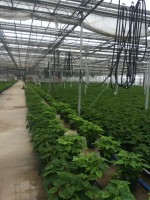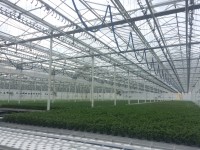Throughout the United States, a majority of cannabis for medical and adult use is grown indoors, which requires a tremendous amount of energy and is generally inefficient. State regulators and cultivators alike are beginning to notice the benefits of greenhouse and outdoor-grown cannabis, primarily for energy efficiency and environmental sustainability.

Terra Tech, a publicly traded company, cultivates environmentally sustainable produce through its subsidiary, Edible Garden, in Belvidere, New Jersey. Utilizing Dutch hydroponic cultivation methods, integrated pest management and computer-controlled automation, Edible Garden grows certified organic herbs such as thyme and basil in their greenhouses in New Jersey.

Edible Garden is certified by the Global Food Safety Initiative (GFSI), which provides internationally recognized benchmarks and guidance for managing food safety and meeting standards. According to Ken VandeVrede, chief operating officer of Terra Tech, the company plans to take these cutting-edge practices and standards from cultivating produce to the cannabis industry to grow quality, sustainable and safe cannabis in states where it is currently legal.
The company is actively making its operations more environmentally sustainable via greenhouse cultivation, Dutch style hydroponics, shipping locally, and integrated pest management. “We plan on implementing guidance from our two years of GFSI certification and our organic certification along with all of our practices from the food side and bring them to cannabis; for us, it is just another plant,” says VandeVrede. With the help of computer automation, he says they can cultivate cannabis at the commercial scale, creating more homogeneity by removing human elements and utilizing environmental controls. Through computer automated blackout curtains in their greenhouses, they plan to minimize energy usage by using natural sunlight when possible.
“The procedures are very similar across industries so we are creating our own internal standards for cannabis cultivation,” says VandeVrede. “We are trying to be at the forefront of the industry and set the standard for growing cannabis, because right now, there are no standards in place.”

Terra Tech has already started its move into the cannabis industry via its subsidiary, IVXX LLC, which makes medical cannabis extracts for dispensaries in California. The company has also broken ground on cultivation and production facilities in Nevada and dispensaries in California, and submitted an application for licenses in Maryland. “Terra Tech is doing everything with vertical integration in mind; we will control the cultivation, bringing experience from our agricultural background to cultivate high quality and high yield cannabis, making oil and extracts with it to sell in our dispensaries,” adds VandeVrede.
Looking to the future of cannabis cultivation, Terra Tech’s plan is to keep environmental sustainability at top of mind. “As a company we are growing indoor, but moving toward greenhouse cultivation across the board”, says VandeVrede. “Our focus on expansion will be [include] greenhouse-grown cannabis, which is a lot more efficient, saving us money but more importantly reducing our overall carbon footprint.” With more companies adopting these sustainable farming practices, the industry might soon usher in a new era of environmentally friendly cannabis cultivation.




Aaron, Are you available for a Consulting project to determine the best prefab solutions for cutting edge vertical farming greenhouses for the cannabis industry?